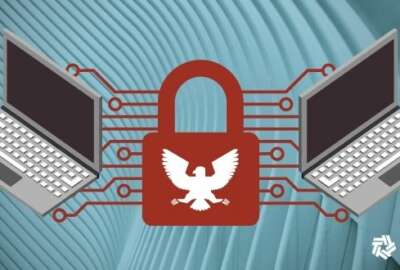To listen to the Federal Newscast on your phone or mobile device, subscribe in PodcastOne or Apple Podcasts. The best listening experience on desktop can be found using Chrome, Firefox or Safari.
- President Biden signed a new executive order designed to promote collective bargaining. The EO creates a new task force to study how the federal government can better mobilize its resources and empower workers to organize. Biden says one of the group’s goals is to ensure the federal government leads by example. The EO says government should serve as a model employer and encourage collective bargaining in the federal workforce. Vice President Kamala Harris and Labor Secretary Marty Walsh will serve as co-chairs for the new task force.
- A new executive order from the White House this morning requires federal contractors to pay a $15 minimum wage to workers on federal contracts. Starting January 30, 2022, agencies will need to incorporate a $15 minimum wage in new solicitations, and begin implementing it by March 30, 2022. The order also calls for the minimum wage to be adjusted for changes in cost of living every year. (Federal News Network)
- Federal employees were more engaged in 2020 despite the pandemic. Or maybe because of it. The governmentwide engagement score sits at 72-points in 2020. That’s four points better than 2019. The Office of Personnel Management says employees felt an especially deep connection to their agency’s mission last year. Widespread telework helped improve scores too. Just 3% of the federal workforce teleworked daily before COVID-19. 59% worked remotely every day at the height of the pandemic. And 47% teleworked daily last fall. (Federal News Network)
- Social Security Commissioner Andrew Saul says the pandemic and its 2021 budget are having an impact on the agency’s service levels. It took SSA field offices 20% longer to complete an action last year. The number of pending disability determination cases is 20% higher today than it was before the pandemic. But SSA says it doesn’t have enough funding to pay for more employee overtime. And Saul says he has no choice but to delay planned hiring to stay within 2021 funding levels. He says SSA needs more funding in 2022 or wait times for service on the phone and in person will increase.
- A bipartisan group of senators want to authorize more hiring at the southern border. Sens. Kyrsten Sinema (D-Ariz.) and John Cornyn (R-Texas) introduced the Bipartisan Border Solutions Act. It would allow the Justice Department and Department of Homeland Security to hire 150 more immigration judges, 250 Border Patrol processing coordinators, 300 asylum officers and more officers at Customs and Border Protection field offices and ports of entry. A bipartisan group of Texas congressmen introduced a companion bill in the House.
- Following in the Pentagon’s footsteps, the Department of Homeland Security says it’s launching its own effort to root out extremism in its workforce. DHS Secretary Alejandro Mayorkas says a new working group will immediately launch a review aimed at preventing, detecting and responding to extremism across all of its component agencies. He says domestic violent extremism is the most “lethal and persistent” terrorism threat the nation faces right now. The working group is tasked with delivering a report with recommendations for further action by DHS, but a statement the department issued Monday gave no clear timeline. (Federal News Network)
- One of the Army’s largest bases is getting an injection of funds to help with housing issues. Later this week, the Army will begin a $1.1 billion renovation of housing on five bases, including Fort Hood in Texas. The funds will improve existing homes and build 1,200 new houses on the bases. The funds are coming from the Army’s private housing partner Lendlease. The funding accelerates building plans by about 10 years. Lendlease is one of a handful of companies that have been called out by lawmakers and military families for housing issues. Service members have reported mold, lead paint and other issues in their privatized homes.
- The Navy and Coast Guard are teaming up to combat illegal fishing and may be using networks to do it. The services are looking for ways to monitor the seas without sending multiple fleets out. One way to do that would be to build buoys that connect to 4G and satellite networks. Illegal fishing has caused tensions between China, the United States and South American countries. Governments fear illegal vessels will threaten species and could traffic humans or illegal goods. (Federal News Network)
- The Office of Management and Budget has committed to fast tracking some policies and regulations under the American Rescue Plan. The Office of Information and Regulatory Affairs (OIRA) is setting a one week goal to review regulations or policy changes that are imminently needed to implement the American Rescue Plan. A new memo from acting OMB director Shalanda Young outlines the procedures, which were also used under the CARES Act and other COVID relief bills. The expedited review process also asks agencies to send OIRA any regulations or policies by noon on Friday that will need weekend consideration. Additionally, OIRA tells agencies to make sure they consider equity impacts in making implementation choices and how to reduce burdens and expand access to underserved communities.
- The Census Bureau is backing up the accuracy of its 2020 apportionment data with indicators that vouch for the quality of the data. The apportionment data determines how many seats each state gets in the House of Representatives. Acting Census Bureau Director Ron Jarmin says that despite pandemic challenges, the bureau underwent one of its most comprehensive reviews of its decennial data.
- The Cybersecurity and Infrastructure Agency is releasing a new tool to counter supply chain cyber threats. CISA’s new guidance, in partnership with NIST, is meant to counter the threat of supply chain cyber threats like the SolarWinds breach. It recommends agencies and industry implement formal cyber supply chain risk management programs, and to know and manage suppliers of critical components. Acting CISA Director Brandon Wales says the SolarWinds breach serves as a wake-up call to prevent similar incidents.
- Attention all employees at the GS-9-to-13 levels, applications for the CXO Fellowship program open on Saturday. If you work in areas of human capital, acquisition or procurement, finance, IT or data, you can apply to the next cohort. Applications for the year-long program open on May 1. The CXO Fellowship program focuses on professional development, networking and career growth. Up to 100 fellows will be chosen for the 2021-2022 fellowship program.
Copyright
© 2025 Federal News Network. All rights reserved. This website is not intended for users located within the European Economic Area.



